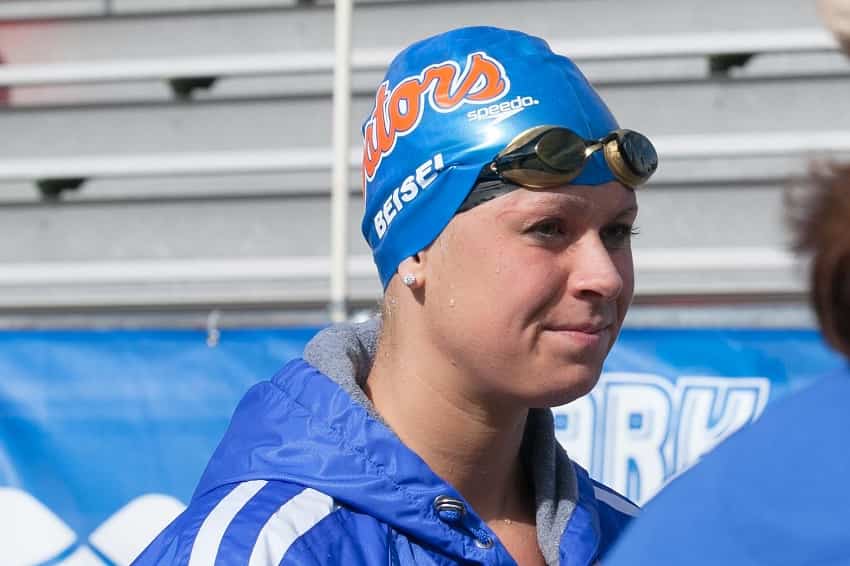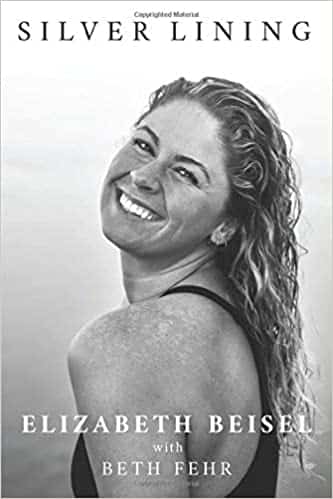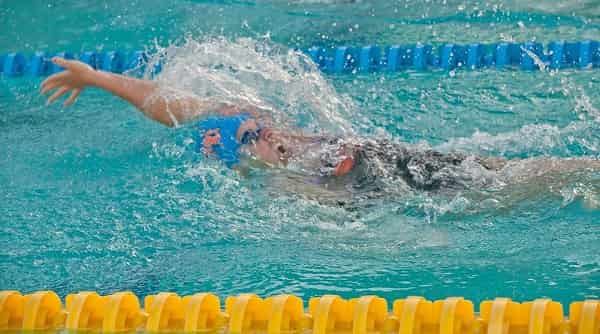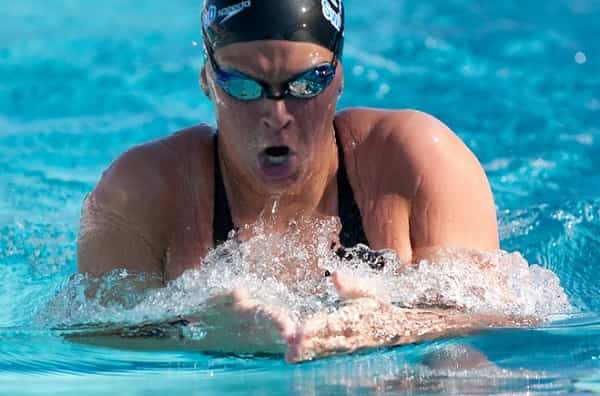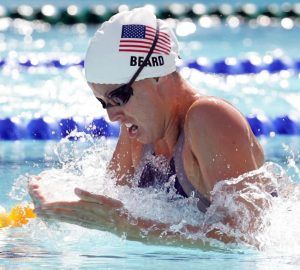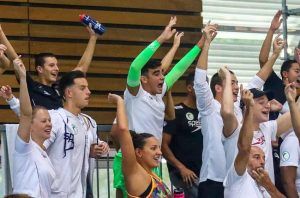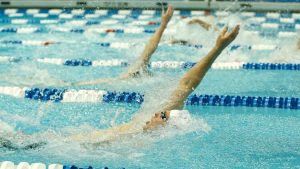Elizabeth Beisel is a 3-time Olympian and double Olympic medalist.
Silver Linings, written with Beth Fehr, is an autobiography that covers Beisel’s swimming career, from her humble beginnings in the Rhode Island age group ranks to representing the United States at three consecutive Olympics Games.
Over the course of Silver Linings, Beisel details it all: The injuries, the triumphs, the highs and lows, the missteps, and the lessons learned along the way.
Silver Linings is and easygoing and excellent read for young swimmers, coaches, and swim parents who want a behind the scenes look at excelling at the sport.
For swimmers, they will see firsthand the sacrifices, commitment, and hard work that goes into creating an Olympian. Swimmers will take away the fact that even elite swimmers are prone to feeling uncertain before a big race, have collapses in confidence, and struggle with the day to day motivation of training.
While the book contains a long line of lessons for swimmers, there were few things in particular that stuck out for me.
Here are some of my favorite quotes, passages, and takeaways from Elizabeth Beisel’s book, Silver Linings.
Where to Buy “Silver Linings” by Elizabeth Beisel
Phenoms aren’t immune to collapsing under nerves.
In 2007, as a freshman in high school, Beisel qualified for her first World Championships meet. She was the youngest American swimmer to ever qualify for the US National Team, and as a result, felt a little out of place among the more senior athletes on the team.
She was just 14 years old, with the next oldest national team member four years older. At that age, that feels like a lifetime. Even though she dreamed of representing the USA internationally, the scope of the meet was overwhelming.
- “There was no question in my mind that I was way out of my league.”
- “Before I went to the ready room, I made my way to the bathroom alone and started vomiting. The nerves were too much, and I was mentally and physically more overwhelmed than I had ever been in my entire life.”
After advancing to the semi-finals in the 200m backstroke, the pre-race nerves only increased. With the big gap in age, she felt like there was no one she could confide in.
- “The doubts in my head echoed louder and as the day went on. After eating lunch, I threw up everything I ate again. I couldn’t keep down any food, and the adrenaline rush as I thought about the race that night kept me wide away during the time I was usually able to take a nap. My body was shaky, and mentally I wasn’t able to focus. When I sat down in the ready room, I felt anything but prepared. Throughout my entire career, I had always been able to rise to the occasion. The size of the meet and my inexperience never seemed to trump my ability to show up when it mattered. But that day, I couldn’t get it together.”
The Olympics are far more intense than what you see on TV
The event is always different than what you imagine it will be. There are things you can’t be replaced by experience. Going to the Olympics was one of them for Beisel.
- “No one can prepare you for the Olympics. It doesn’t matter how much you train, how hard you push yourself, or how laser-focused you are. There’s literally no event in the world that can even come close to the experience of the Olympic Games…. The actuality was far different than my childhood imaginings. The truth is I had only ever fantasized about what I saw on television; the lights and banners at the opening ceremony, the finely-tuned robust athletes competing for their countries, and of course the medals.”
Use your disappointments to fuel the next step
At the Beijing Olympics, Beisel placed fourth in the 400-meter individual medley and fifth in the 200-meter backstroke. Her time from Trials in the 200-meter backstroke would have won her a silver medal in Beijing. Beisel left Beijing disappointed.
- “It wasn’t that I did my best and I wasn’t able to medal, it was that I hadn’t been able to deliver when it mattered most.”
- Placing outside the medals in Beijing “made me more motivated than ever to go home, train harder, and return better.”
- “Those setbacks were painful, sometimes excruciatingly so, but they also gave me the launching pad I needed in order to propel myself to the next level.”
On the flight home, sitting beside teammate Allison Schmitt, who had placed ninth in her individual event, the 200-meter freestyle, the two youngest members of the US Olympic team plotted their return four years later.
They would turn the setbacks into comebacks.
- “There was no way weren’t going to return more experienced, faster, stronger, and better prepared. We weren’t just coming back; we were coming back with a vengeance.”
Just have fun
Squash anxiety and doubt before the big race with the oldest piece of advice in the book: Just have fun.
At the 2011 World Aquatics Championships in Shanghai, Beisel posted the fastest time in the heats of the 400m individual medley.
Even though she was going in as the top seed, her warm-up before the final did not go well. She was significantly off her target race pace, doing 50’s of breaststroke in :44 when she was supposed to be holding :39s.
Her mind was spinning with doubt. She felt like she was over it, especially after placing fifth in the 200-meter backstroke, an event she thought she should have won.
Gregg Troy, her coach at the University of Florida, approached a moping Beisel after she got out of the warm-up pool and pulled her aside.
- “Elizabeth, just do one thing tonight,” said Troy. “Just have fun. Just smile, enjoy it. Even if you don’t have the greatest race, have fun doing it. That’s why you are here… forget about the pace, that doesn’t mean anything. Just have fun.”
Beisel recounts her reaction:
- “I stood there perplexed. Just have fun? Fun? Fun. Right, I remembered fun. Not going out partying on campus, but those days when I could barely keep from bursting from sheer joy when we pulled up to the pool for practice. That intrinsic feeling of completion being in the water used to give me, before my pace mattered, or my times dictated whether or not my swim was good or bad. Any day in the pool used to be a great day, and I hadn’t started swimming to be a champion. That’s not what the goal at the beginning. The only thing I cared about was being in the water, and before all of the meets, and the qualifiers, and the intervals, and the technical training, and the rankings, and the crowds, the water had been enough. That was all I wanted when I started swimming, and somewhere along the way I had completely lost sight of that simple happiness that had drawn me to the pool in the first place.”
- “The rest of the time before my race, I clung to those three words. Just. Have. Fun. I repeated them over and over. I was already at the World Championships… I might as well enjoy the moment. I wasn’t swimming great, that was already a given. So, I could pout my way out to the block and sullenly swim alongside athletes who were the best in the world at what they did or I could race. I could do what I loved, soak in every single moment that I was in the pool and hit the wall as fast and as hard as I could, because I was there, and even if I lost, I was still amongst the best of the best.”
- “Coach Troy had made his point; this was a moment worth savoring.”
- “When I finished, I didn’t care what happened. I knew I had given that swim everything I had, but the thunderous applause of the crowd was the icing on the cake… I swam the fastest time of my life, and that day I became a World Champion.”
All you can do is your best
At the London Olympics, Beisel was confident that she would take home the gold in the 400-meter individual medley. Training had been going great, she was part of a strong USA team, and Coach Troy was on the coaching staff.
- “If you touch first at the 300 after breaststroke, you’re winning a gold medal tonight,” Coach Troy had told her.
When Beisel completed the breaststroke leg, she had a substantial lead. The gold was hers.
- “My heart skipped a beat when I completed that turn, knowing that I was about to be an Olympic gold medalist.”
But it didn’t take long for that dream to collapse.
After just 25m of freestyle, a fast-moving splash in the lane next to Beisel was closing the gap. Quickly. By the time they turned at 350-meters, Ye Shiwen had blown past her with “so much momentum that I felt as if I had literally stopped moving. I tried with everything I had to catch her, but she only kept pulling farther and farther away.”
Beisel touched the wall, claiming silver. But she was at a loss. She had been winning at the 300-meter mark… what had happened? The doubts came crashing down:
- “Did the training not work? Had I choked on my freestyle? Was I not as strong as I thought?”
- “I had just won my first Olympic medal, but I couldn’t help but feel disappointed… The magic and certainty I had felt since arriving in London exploded into a thousand pieces and twisted and turned sharply in my stomach.”
Making matters worse was the media gauntlet in the moments after the race.
- “Not a single interviewer congratulated me on my silver medal. ‘What happened in the last 100?’ ‘Did you see her coming?’ ‘You were the favorite for gold, how does it feel to win silver instead?’” (p 164)
- “I was crushed that I wasn’t able to do what was expected of me—win gold.”
After the post-race breakdown, where Beisel realized she had swum the fastest freestyle split she’d swum, and that Shiwen’s freestyle leg was faster than the freestyle split Ryan Lochte put up to win the men’s 400m individual medley, there was a sense of relief. She’d done her best. That was all she could ask of herself.
- “My best was my best, regardless of where that put me in the competition, and there was peace of mind that came with this newfound knowledge.”
Buy “Silver Linings” by Elizabeth Beisel
Or, you can check out our list of books for swim coaches and our list of recommended books for swimmers.

